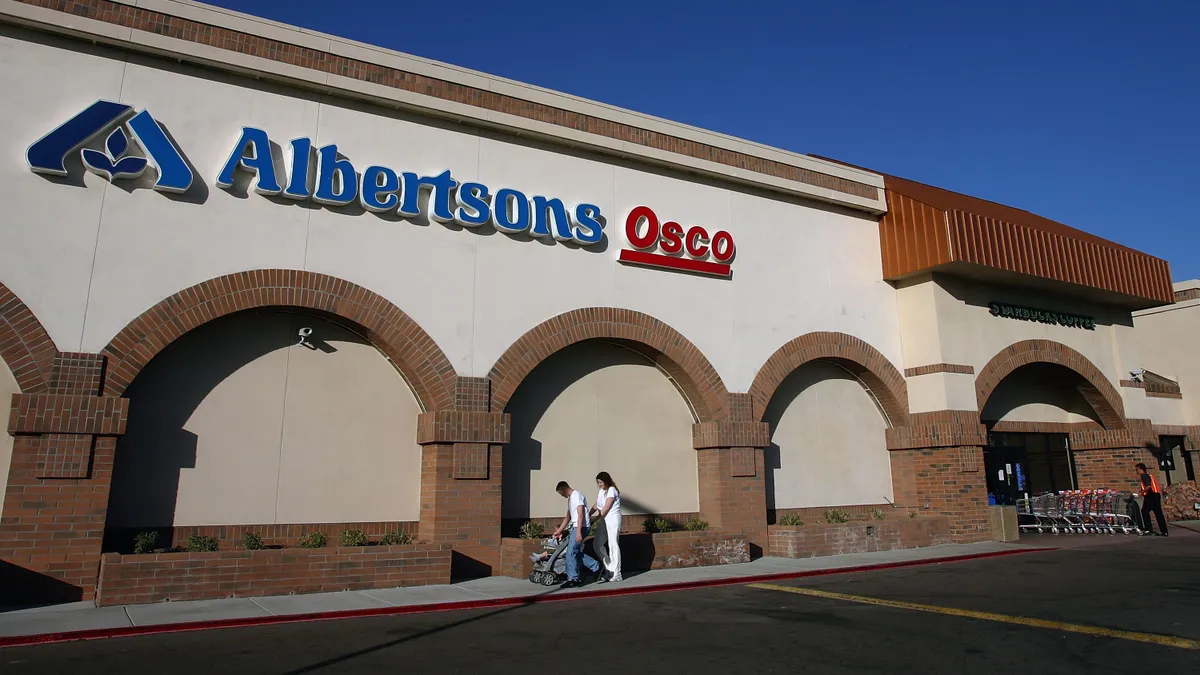UPDATE: May 20, 2022: Albertsons plans to add smart carts to “a few dozen stores” across the U.S. later this year, according to an announcement by Veeve, the technology firm that manufactures the carts. The expansion builds on a pilot the companies launched last year at two stores — one in Idaho, the other in California.
Veeve’s smart carts allow shoppers to scan products and have a touch screen that provides a running total of items inside the cart. The carts also integrate with Albertsons for U loyalty program and allow shoppers to pay using the digital terminal and skip the checkout line.
In an interview last year, Veeve CEO Shariq Siddiqui said the company wants to turn its smart cart into a “platform” that incorporates in-store navigation, digital ads, recipes, e-commerce and more.
Dive Brief:
- Albertsons is testing smart carts made by Seattle-based Veeve at two locations — an Albertsons store in Eagle, Idaho, and a Safeway store in Pleasanton, California — according to a report last week in BoiseDev that was confirmed by Veeve.
- Veeve is also testing its carts with Kroger in multiple Midwestern markets, Veeve CEO Shariq Siddiqui said. This builds on the one-store pilot Kroger announced earlier this year with Caper, which was recently acquired by Instacart.
- Grocers are taking a hard look at smart carts, which claim to speed up the shopping process for consumers and deliver valuable business intelligence to retailers.
Dive Insight:
Albertsons’ smart cart pilot is in the very early stages right now, and it’s unclear if it will expand beyond just a few stores. An Albertsons spokesperson confirmed it’s testing the technology but declined to answer questions about its performance to date, whether the company is working with other smart cart makers and other details.
The test run indicates Albertsons, like other retailers, is closely looking at smart carts as a way to improve the shopping experience and also deliver consumer data on in-store shopping. Amazon’s development of the Dash Cart, which the company unveiled for its Fresh stores last year, has spurred grocers to test out the technology themselves, and Instacart’s acquisition of Caper last month seems to lay the groundwork for a large-scale expansion of smart carts inside stores across the country.
News that Albertsons’ rival Kroger was testing a smart cart made by Caper emerged early this year, and the grocer has expanded that run to include Veeve-made carts as well. A Kroger spokesperson did not respond to an inquiry about the scope of its smart cart tests at this point. An Instacart spokesperson, meanwhile, said Caper has hundreds of carts running with grocery chains like Kroger, Wakefern and Sobeys, and said the technology companies are currently working on lowering the cost of each cart.
Firms like Caper and Veeve are also working to make smart carts easy for shoppers to use. Veeve’s tech-enhanced cart integrates with Albertsons’ loyalty program and uses a combination of barcode scanning and computer vision technology to log the products that customers select, according to Siddiqui. Shoppers are required to scan a barcode on each item, including produce, deli and prepared foods selections, while sensors inside the cart capture the product being placed inside and then weigh it, if needed. The sensors can also detect if a shopper takes an item out of the cart and deduct that from the running total.
Smart cart makers like Veeve and Caper market their computer vision systems, but Siddiqui said grocery executives have so far felt more secure requiring shoppers to first barcode scan each product. Siddiqui said the carts inside Albertsons’ store, which are branded with the Albertsons logo, work like self-checkout machines, with the computer vision system working in the background and training itself to better recognize products. He expects that process whereby consumers just place products inside the cart will soon become the main operating mode for its partner retailers, with barcode scanning as a backup in case the cart doesn’t recognize an item.
Siddiqui said Veeve plans to begin adding personalization features to its carts beginning next year. This includes integrating shopping lists along with a store navigation feature that directs shoppers to each item. The company is also working on a tool that lets shoppers select popular local recipes on the cart’s touchscreen and populate a shopping list, and another feature that reminds shoppers of items they’ve bought in the past as they roll by them.
Veeve is also exploring e-commerce tools that connect shoppers to retailers’ online marketplaces and let them add products that are out of stock in stores to their digital carts.
“You can think of the cart less like a checkout solution and more like a platform,” Siddiqui said.
The most important features for smart carts, though, may be those that deliver information to retailers on how shoppers are navigating their stores, which products they’re buying and other valuable data points. This is the same value that frictionless checkout companies like Trigo, Standard AI and Zippin, which use sophisticated software programs and AI-enabled cameras to track shoppers and the items they select, promote to retailers. Retailers like Walmart are also encouraging shoppers to use their app when they shop to scan products for more information and even check out as well.
Altogether, this paints a picture of a future where retailers can gather data on in-store shopping with the same granularity as the data they collect on online shopping.
“Digitizing the store is not optional any longer,” said Siddiqui. “If you don’t do it, you’re going to be left out."













